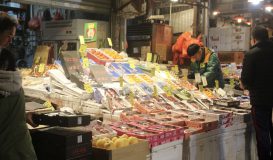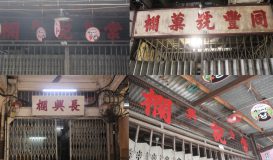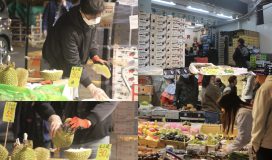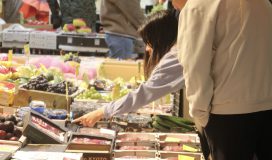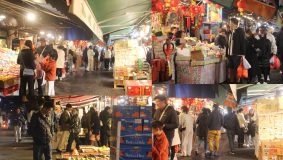3036030831 Chiu Yin Ching (Scarlett)
3036219322 Chan Kam Yin (Kevin)
Video: https://youtu.be/WlN2XXheVkU
Transcript:
Scarlett: Hello listeners and welcome to our podcast. Today we will be discussing one of my mother’s favorite places to visit, the fruit market! My name is Chiu Yin Ching…
Kevin: …and my name is Chan Kam Yin. Let’s begin by introducing the Yau Ma Tei Fruit Market.
Scarlett : The Yau Ma Tei Fruit Market is a vibrant and iconic landmark in Hong Kong. It’s known for its lively ambience and wide assortment of fresh fruits. Founded in the early 1900s, the Yau Ma Tei fruit market has now evolved into a vital component of Hong Kong’s cultural landscape. However, with the city of Hong Kong developing at a rapid pace, the needs of its residents are also changing and the Yau Ma Tei fruit market may soon become a thing of the past.
Kevin: Thing of the past? Why is that?
Scarlett: Although the fruit market is popular among tourists and locals alike, it has also had its fair share of difficulties. Noise complaints pertain to one of the primary issues. The bustling atmosphere of the market which is busiest at night has led to formal complaints about noise levels from Yau Ma Tei residents. Unfortunately these issues have not received enough attention in spite of their best efforts. The market’s pedestrian pathway being blocked is another issue. When arriving at the market, visitors are met with wooden planks that obstruct their path and make it difficult to move around the space. The HK Government has voiced that they recognise the residents’ concerns, and plan to move the Yau Ma Tei fruit market to eradicate these problems. The relocation that is being suggested is intended to improve the overall experience for both vendors and visitors as well as to mitigate the residents’ concerns.
Kevin: Now let’s talk about the history of the Yau Ma Tei fruit market. The HK Yau Ma Tei Fruit Market has a rich history and continues to serve important purposes in the present day. Established in the early 20th century, around the 1910s, it is located in the Yau Ma Tei district of Hong Kong. Initially, it was a small-scale market catering to the local community, specializing in the sale of fresh fruits and vegetables.
Operating as an open-air market with individual stalls or makeshift setups, it played a crucial role in the local economy and food supply chain. Acting as a hub for both wholesale and retail fruit trading, it attracted local residents, restaurants, and retailers seeking high-quality produce. The market’s vibrant atmosphere and bustling activity made it an iconic landmark and cultural symbol of the Yau Ma Tei area.
In recent years, the Yau Ma Tei Fruit Market has undergone significant redevelopment and modernization. It has been transformed into a modern market complex with improved facilities, including proper stalls, storage, and utilities. While maintaining its primary focus on the sale of fresh fruits and vegetables, it has become a popular destination for both locals and tourists.
The market offers a wide variety of local and imported fruits and vegetables, supporting both wholesale and retail transactions. It incorporates hygiene and food safety measures to ensure quality standards. The market provides a convenient shopping experience with a diverse range of vendors, contributing to the local economy and remaining an integral part of the community.
The purpose of the HK Yau Ma Tei Fruit Market is multi-faceted. It supplies fresh produce to the local community, supports local farmers and suppliers, and provides a central location for buyers and sellers to connect. Additionally, it plays a role in preserving the cultural heritage of the Yau Ma Tei district while promoting healthy eating and a balanced diet. The market offers a unique shopping experience for residents and tourists, stimulating economic activity in the area. It also fosters community engagement and social interaction while showcasing the diverse array of fruits and vegetables available in Hong Kong.
Scarlett: What’s going to happen if the market vanishes?
Kevin: The impending disappearance of the HK Yau Ma Tei Fruit Market is likely to have various effects on different groups of people, eliciting a range of feelings and attitudes.
Local residents, who heavily rely on the market for their daily supply of fresh fruits and vegetables, may experience a sense of loss and inconvenience. They may lament the disappearance of a familiar and accessible shopping option that they have relied on for years. The absence of the market could leave them disappointed, especially if alternative sources for affordable produce are not readily available.
For small-scale vendors who have operated in the market for an extended period, the closure can significantly impact their livelihoods. They may face financial hardships and uncertainty as they lose their established customer base. The struggle to find alternative locations or business opportunities can further exacerbate their challenges.
Wholesale traders, who consider the market a vital hub for their business operations, may encounter difficulties in finding a suitable replacement. They may need to adapt their distribution channels and incur additional costs in transportation and logistics to maintain their supply chain.
Restaurants and retailers that depend on the market for their fresh produce supply may need to explore alternative sourcing options. The closure of the market could disrupt their supply chain, potentially resulting in higher prices or reduced availability of certain items. They may need to adjust their operations to mitigate the impact.
The closure of a historic and culturally significant market like the Yau Ma Tei Fruit Market could also have implications for tourists and visitors. Those who enjoy exploring local markets and immersing themselves in the vibrant atmosphere may feel a sense of disappointment. They may miss out on an authentic cultural experience that the market previously offered.
It’s important to note that the feelings and attitudes described above are not universal and may vary among individuals within each group. Some stakeholders may adapt and find alternative solutions or opportunities, while others may face more significant challenges and negative sentiments.
Scarlett: Is there any action being taken to prevent the fruit market from disappearing forever?
Kevin: Yes, after proposing reconstruction plans In recent years, the Government has finally decided to split the wholesale part and rebuild a modern market. Under the proposed plan, the market will be turned into a tourist spot, complemented by a new boutique hotel, open space and an art and cultural area. The wholesale operations will be relocated to a commercial building near the market at Hau Cheung Street.
Scarlett: Well looks like that’s all the time we have today. Thank you again for listening to our podcast.
Kevin: See you next time!
Stills:
